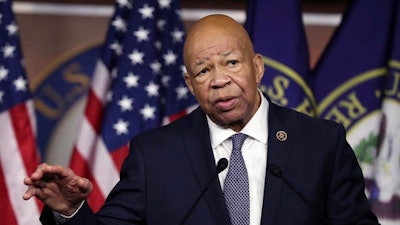
WASHINGTON (AP) — Marathon Pharmaceuticals announced Monday that it will temporarily halt the rollout of a drug to treat genetic muscle deterioration just hours after two members of Congress expressed outrage that the company planned to charge $89,000 a year for a drug that's widely available abroad for about $1,000 a year.
Sen. Bernie Sanders, I-Vt., and Rep. Elijah Cummings, D-Md., urged the company earlier in the day to lower the drug's price. They warned that they would be investigating how Marathon Pharmaceuticals set its pricing and contended that the company was abusing a program that grants seven years of market exclusivity to encourage research into new treatments for rare diseases. The program, they said, was not established to reward companies for drugs that have been available for decades.
"Exorbitantly pricing potentially life-saving medications that should be widely available for a fraction of the price hinders patient access and drives up costs for the entire health care sector," the lawmakers wrote.
The U.S. Food and Drug Administration approved the drug last week to treat patients with Duchenne Muscular Dystrophy. While the steroid is commonly used globally, the FDA's action represents the first approval of deflazacort for use in the U.S. The drug will be marketed under the brand name Emflaza.
The disease affects about 15,000 people. People with the disease progressively lose the ability to perform activities independently and often require use of a wheelchair by their early teens. Patients typically succumb to the disease in their 20s or 30s, but disease severity and life expectancy vary. In a clinical study of 196 male patients, those taking the drug had improvements in strength across a number of muscles compared to those taking a placebo.
In recent months, lawmakers have repeatedly challenged drug companies on drug pricing. Soon after the criticism by Sanders and Cummings, Marathon Pharmaceuticals released a statement and what it described as an open letter to those involved in treating and caring for people with Duchenne muscular dystrophy from the company's chairman and CEO, Jeff Aronin.
Aronin said the company invested substantial resources into the drug and didn't expect to recoup its investment for several years while only having seven years of market exclusivity.
"If we are profitable, we are committed to re-investing our earnings from EMFLAZA into additional research into Duchenne. We are in regular contact with leaders of the Duchenne community about our plans and look forward to continuing that engagement," Aronin said.
Aronin said he wanted to assure caregivers and others that in preliminary meetings with the insurance community, many "have acknowledged the price was appropriate given the very small patient population."
Sanders and Cummings said in their letter seeking details from Marathon Pharmaceutical about their expenses, revenue and profit estimates, that patients had been paying about $1,000 a year for deflazacort. But Aronin said in his open letter that a small percentage of patients, roughly 7 to 9 percent, imported the drug from overseas.
"Our goal in commercializing EMFLAZA all along has been to make it available to a much broader set of patients who, prior to FDA approval, have not had access to this therapy," Aronin said. "There was also much we did not know about using the drug in the Duchenne patient population including proper dosing, potential side effects and drug-to-drug interactions."
Lawmakers challenged Mylan NV last year for its EpiPen pricing, which has climbed more than 500 percent since 2007. CVS is now selling a rival, generic version of EpiPen at about a sixth of the price of the brand-name version of the life-saving allergy treatment.






















